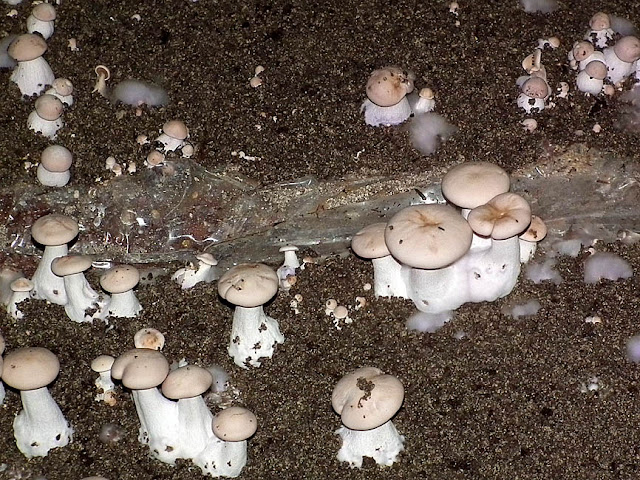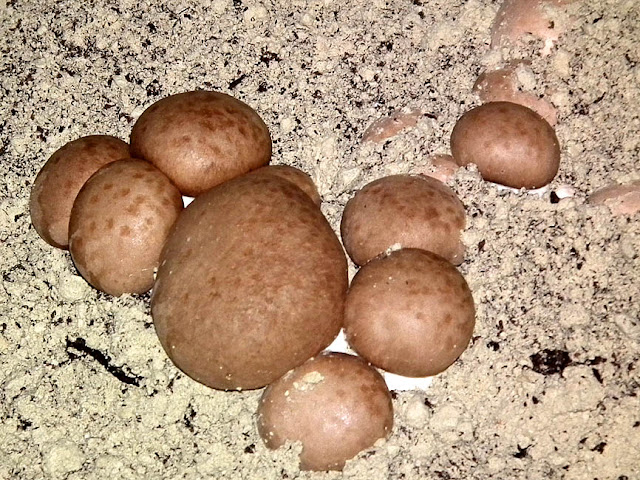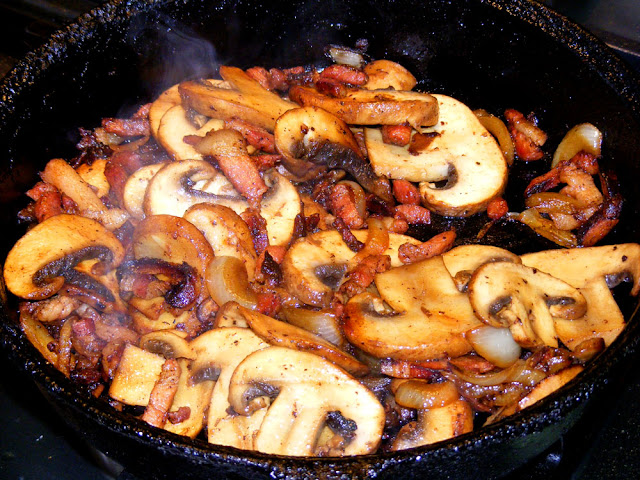The organic substrate on which the mushrooms grow is prepared from horse manure and wheat straw, naturally fermented and decomposed into compost. The compost is pasturised to meet health and hygiene standards and to ensure no bad bacteria or fungi will infect the cultivation.
Mushrooms being cultivated in a former underground limestone quarry at Bourré.
Then it is put into big sacks or containers and innoculated with mycelium selected from a laboratory culture. Incubation is done under controlled conditions to make sure the mycelium penetrates all through the compost. The last step, essential to ensuring fruiting bodies (ie the mushrooms we eat) appear, is to cover the compost with a mixture of peat and crumbled limestone.
Wood Blewit Clitocybe nuda (Fr. Pied bleu) being cultivated at Bourré.
The containers are put in a protected environment where the temperature, humidity and ventilation are carefully controlled. At the end of one week the mycelium will have completely invaded the compost and the fruiting phase will have begun (ie mushrooms will start to appear).
Chestnut Mushroom Agaricus bisporus (Fr. Champignon blond) being cultivated at Bourré.
The mushroom farmer will decide when the ideal moment to pick them is and harvesting each sack will cease when the numbers of mushrooms appearing is tending to decline. Production never stops though. The sacks are endlessly renewed. Spent compost is used to fertilise the fields.
Cave grown mushrooms at the market in Loches.
The mushrooms are picked by hand, sorted according to their degree of maturity, their quality, their colour (white or chestnut), then arranged in baskets, punnets or boxes. They are stored in coldrooms until they are sent out to their point of sale. They must reach their retail destination within 24 hours of being picked in order to maintain their quality.
Frying cave grown mushrooms with lardons and onions.
Cave grown mushrooms can be kept several days in the refrigerator.
************************************************
For details of our private guided tours of chateaux, gardens, wineries, markets and more please visit the Loire Valley Time Travel website. We would be delighted to design a tour for you.
We are also on Instagram, so check us out to see a regularly updated selection of our very best photos.
We are also on Instagram, so check us out to see a regularly updated selection of our very best photos.






4 comments:
I like your terms for mushroom color, white or chestnut. In French, they are either blancs () or blonds. That can be a serious pronunciation or aural comprehension problem for Anglophones.
Ooooh! You are right, and it had never occurred to me. I obviously point in a perfectly adequate way because I've never had a weird conversation about which colour mushrooms I want. Or possibly Hendrick knows me so well by know that he can predict what I'll buy. And if necessary we can discuss the matter in English :-)
Ken, they call them "champignons roses" on our market.
I've sometimes seen them called champignons roses too, now that you mention it. But I think 'blond' is the more 'official' term.
Post a Comment